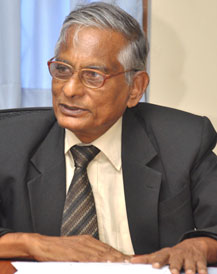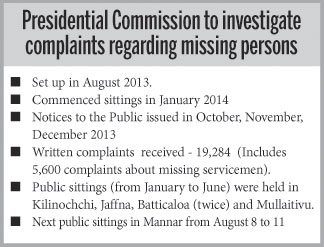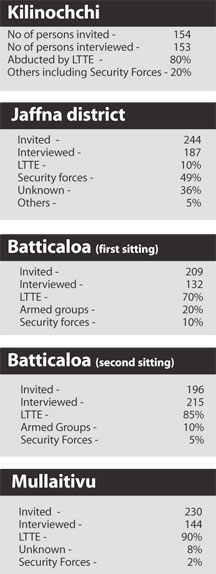|
Presidential Commission on Missing Persons receive
19,000 complaints:
Presence of International advisors increases people's faith
By Manjula Fernando
|

Former High Court Judge Maxwell Paranagama
Pic: Susantha Wijegunasekera
|
Chairman of the Presidential Commission on Missing Persons, former
High Court Judge Maxwell Parakrama Paranagama in an interview with the
Sunday Observer said that over 19,000 complaints received during the
past seven months is testimony to the trust people have placed on the
Commission, notwithstanding the politically-driven criticism of it being
an eyewash.
Q: What was the need to appoint an international advisory
panel to the Commission on missing people, Was it due to international
pressure?
A: We have had sittings in Kilinochchi, Batticaloa, Jaffna and
Mullaitivu. After these sittings we found that we needed an expanded
warrant to look into the cases. We have been discussing this. President
Mahinda Rajapaksa would have received the information, and thought
accordingly and decided to expand the warrant issued.
Since the expanded warrant refers to violation of international
humanitarian law, we thought that some expert advice was necessary,
because these areas are quite new to us.
The Presidential Commission is appointed in an advisory capacity. The
warrant reserves the right for the President to appoint additional
members if there is a need. The Commission is also mindful of the fact
that there will be no unnecessary international interference.
Q: What are the findings that prompted you to decide on an
extended warrant and the appointment of the expert panel?
A: There were areas on submissions made by the complainants
which we thought may be instances, by the armed forces and the LTTE as
having violated international law. Unless the warrant is expanded, the
Commission could not have looked into such cases. On these aspects we
needed an expert panel to advise us, because that will be on the basis
of international law.
Q: When will you be seeking their advice?
A: Already we have heard submissions by complainants, on that
itself we might be able to come to conclusions of violations of
international law. Advice of the experts will be sought to come to that
conclusion.
 Q: The Commission had been sitting for seven months, can you
sum up the work completed so far? Q: The Commission had been sitting for seven months, can you
sum up the work completed so far?
A: We have covered about 750 complaints so far. We have had
sittings in Kilinochchi, Jaffna, Batticaloa and Mullaitivu.
From the submissions that have been made so far, we are determining
if any person, group or Agency is responsible for those missing persons.
We are preparing a list where there is substantial evidence about
various missing people. The Commission has identified such cases and are
in the process of finalising them to make recommendations as to who is
responsible for these disappearances.
Q: Can you say if the perpetrators are from the LTTE or the
military ?
A: Since my warrant says I should submit a report to the
President, I don't want to divulge what will be in the report.
Q: This Commission was appointed by the President. Do you
think the Tamil people have faith in it?
A: I believe so. When we issued the print notice via the media
and after the announcements through Divisional Secretaries, we received
over 19,000 written complaints. When we visit the places for hearings,
about 400 fresh complaints are made at each station.
This huge response speaks for itself of the trust people have in the
Commission. They have spoken of alleged LTTE abductions and instances
where the military too has been responsible.
Q: Have you noticed any reluctance by the people to make
complaints against the Security Forces?
A: We have not seen any reluctance. People did make complaints
against the Security Forces.
Q: Human rights groups have raised concerns about the
protection of witnesses. Has this area been looked into ?
 A: The Witness Protection Bill is in the process of being
presented in Parliament. Where the Commission is concerned, the Act says
that if someone obstructs or creates any problem, he can be reported in
the Court of Appeal. He will be dealt under Contempt of Court. That
provision is there. But we did not come across such an instance so far. A: The Witness Protection Bill is in the process of being
presented in Parliament. Where the Commission is concerned, the Act says
that if someone obstructs or creates any problem, he can be reported in
the Court of Appeal. He will be dealt under Contempt of Court. That
provision is there. But we did not come across such an instance so far.
But there have been complains by journalists who were there. When the
Commission scheduled sittings in Kilinochchi, the same day the
Government held a mobile camp at a venue close by. There was a bit of
confusion in the sense that people who wanted to come to our sittings
were seated at the other venue and vice versa. The mishap was later
sorted out through public announcements.
Journalists made an issue over this claiming that the other event was
organised to sabotage the sittings of the Commission. There have been
many such complaints but no complaints of threats and intimidation.
Before the Commission was set up, people complained of missing people
to the Terrorism Investigation Unit(TID). The TID had been investigating
these cases. In one instance the TID fixed inquiries on the same day of
our sittings in Mullaitivu. The media was fast to criticize this.
Thereafter I wrote to the IGP asking him to avoid such situations
because we needed to avoid unnecessary negative publicity. The media has
been allowed to cover the sittings in the North and the East. We want to
maintain transparency.
Q: Once the hearings are over, what will be the next step?
A: After the written complaints are received, we schedule
sittings in those areas and hear the complainants evidence. We also
question them. If we find evidence that merit an investigation against
some persons or some organisation, then we will refer the case to the
investigators. Later if we are satisfied that there is a clear case, it
will be included in the report to the President. The report may be
referred to the Attorney General to initiate criminal proceedings.
The earlier mandate requires us to recommend relief to be given to
those families, various facilities, financial assistance and living
allowance. We will make a list of such people to ensure that they will
be assisted in the future.
In addition, missing people's relatives live in grief, they go to
various kovils, temples and fortune tellers in the hope of getting some
kind of information about their loved ones.
Day in and out they live in grief. I think there needs to be some
sort of counselling facilities to comfort them.
When we made inquiries about this need, we found there were various
ministries offering counselling services to the war affected. These
services have little or no coordination. We have summoned members of
these different units and held workshops. There are already about
500-600 counsellors in those units. We formed a steering committee with
the aim of streamlining and setting up one counselling unit to address
this issue. There will be a monitoring unit to supervise their work.The
ICRC had offered to train our counsellors.
Q: When will this unit start operations?
A: Foreign experts are due to come in September. By September
we will set it in motion.
Q: Has the Commission received endorsements from International
Agencies like the UN and the ICRC?
A: Their representatives come and meet us to discuss the
progress of the Commission's proceedings. Now that we have a broadened
mandate, they will share with me the material with regard to
international law and relevant tribunal decisions. They have expressed
satisfaction over the work that we have undertaken and completed so far.
Q: TNA parliamentarian Suresh Premachandran at one point said
the Presidential Commission was an eyewash and Tamil people had no faith
in this mechanism. Your comments?
A: Even in a cricket match your opponent's aim is to get you
out. They are doing politics against the Government. I am not concerned
about that. I am not political minded. The President has entrusted us
with a job of work. And we are doing it to the best of our ability. We
are not bothered about political interpretations.People have trust in
the Commission which has been proved by the overwhelming response of
19,000 written complaints. When we visit the areas, we receive 400 to
500 fresh complaints. How can they say this is an eyewash. Certainly we
will do something.
I served in the Lessons Learnt and Reconciliation Commission (LLRC),
at the beginning some said that, that was an eyewash, today what has
happened.
Those are politically motivated comments. I am a retired judge, I am
not a politician.
Q: The entire 19,000 applications are of missing persons?
A: The majority, but there are cases where parents have found
the bodies, such cases do not come under the missing persons category.
Parents come with pain of mind and we cannot turn them away. We are
compelled to give them a hearing and see if there is a way to help them.
The old mandate was to investigate the case of missing persons. The
expanded mandate says to what extent the Forces and the LTTE have
violated international humanitarian and Human Rights laws. We will look
into child recruitment and the use of a human shield by the LTTE.
Q: Initially the mandate covered the 1990 to 2009 period, but
now it has been backdated to 1983 ?
A: This is also due to our requests. Some people come to us
with very old incidents, if he is denied of a hearing, they want to know
why. They are not worried about technicalities.
They ask ‘why can't you record my child's case?’ There were a few
instances where the IPKF was accused. This was the reason to backdate
the mandate period.
Q: Are you satisfied with the way the Commission has been
facilitated by the Government to carry out its task?
A: On and off I meet President's Secretary Lalith Weeratunga
to discuss matters and explain our needs.
There has been no delays in fulfilling our requests. I did not know
that I have been appointed to the Commission till the warrant came home.
I have never met the President since my appointment.
Q: Will you be having sittings in the southern part of the
country as well?
A: Our mandate is for the Northern and Eastern provinces only.
Having said this, if we come across a case where a person going
missing outside the North and the East and connected to the conflict, we
will be compelled to take a decision.
In such instances I might give a wide interpretation to the
Commission's mandate and look into it. But it is premature to take a
decision on that now.
Q: How long will it take to conclude the sittings and finalise
the report to the President?
A: There are 19,000 complaints and we have been given a very
broad mandate, it is not humanely possible to give a particular date. If
there are time limits, we may not do a proper job. I will have to cut
short hearing a person or I might want to cut down on the complaints. So
I am not focusing my mind at the moment on a timeframe.
I will do the best I can do, if someone complains of our speed, and
says I am incapable, then I am ready to go. It is not easy to listen to
people from 9.00am to 5.00pm for four days with just a 45 minute lunch
break. It can be very tiring. We cover 50 – 60 cases each day. In
Mullaitivu it took more time to listen to them. It was the last site of
the war on terrorism.
People there had lengthy stories about the shelling while crossing
the Nandikadal lagoon. In Jaffna the stories were relatively short.
Q: Do you think there may be negative findings and
recommendations that may not go down well with the authorities?
A: No war on terrorism can be fought according to the book.
You cannot accept everything to be done right. There may be negative
findings. We will point these out. If someone says nothing had happened,
I do not think he is speaking the truth. But the international law
speaks of proportionality, what we need to establish is if this
proportionality has been breached.
Q: The Government maintains that Sri Lanka has a professional
military. Our service personnel serve in the UN peacekeeping forces
world over?
A: Yes. It is a tough job.
Q: You have to cover 19,000 cases altogether. Can't you
short-list the most important cases and expedite the process ?
A: We have covered about 750 cases so far. We might want to
short-list the cases but the President has advised us to investigate
each and every complaint. We will discuss this matter further to reach
an agreement.Of the 19,000 cases, 5600 are complaints made by parents of
servicemen who have gone missing during the conflict. Their bodies have
not been found and some parents believe that their sons are still among
the living.
|

